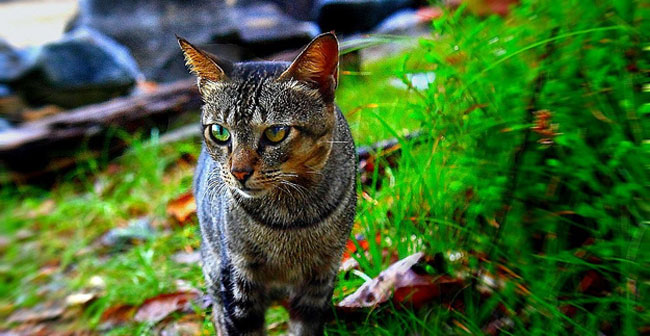Can Wild Cats Be the Source of a Pet’s Fleas?
By Chris Williams on October 2, 2013.

Question
We have several apparently feral cats that live around the apartment property next door. Could my dog be getting fleas from these cats? He’s confined to our fenced yard when he’s outside and I thought fleas stayed on the animal they were feeding on. Would fleas travel from the apartment property to our yard?
Answer
The fleas wouldn’t be traveling to your yard, but the cats might be. At night or other times when your dog isn’t in the yard, it’s very possible that a cat or two is investigating your property. It’s true that adult fleas tend to remain on the animal. If you’re a flea, why leave a reliable food source? But the female fleas randomly lay eggs while they are on the animal. The eggs are designed to drop off of the animal to the ground or, ideally, to the animal’s bedding/nesting area.
It’s possible for flea eggs to drop off in your yard and for the resulting larvae to develop there. After the larvae pupate and turn into adult fleas, they would be waiting for any kind of animal to pass by so they can hitch a ride and get a blood meal. Some people think that the cat fleas found on cats won’t infest dogs. But actually the most common flea on dogs is the cat flea. Cat fleas also infest wild animals like raccoons and opossums. So if these animals frequent your yard, the same scenario can occur.
You could blame your dog’s fleas on cats visiting your yard, but it’s even more likely that your dog is being reinfested with his own fleas in his own yard. Let’s assume your dog has been treated for fleas and your home has been treated for fleas (both steps are essential), but your dog is getting reinfested with fleas after a period of time. If you’ve had a bad flea infestation but your yard hasn’t been treated, flea eggs that dropped from your dog outside a month ago, before he was treated, could produce a new outdoor crop of fleas. These fleas would then jump on your dog when he goes outside. If your dog has had an on-animal flea treatment that is still effective, these fleas should soon die. But if your dog wasn’t treated with a long lasting flea product or if that product’s effectiveness has worn off, he could be infested again.
Flea Control is a Multi-Step Process
Effective flea control requires:
- Treatment of the pet with an on-animal flea control (either by you or your vet),
- Insecticide treatment of high risk areas in your home (primarily areas where your pet spends its time resting) by a professional pest control company, at the same time the pet is treated,
- Insecticide treatment of outdoor areas when the infestation is heavy and/or when the pet spends a lot of time outdoors.
Skipping one of these three steps can mean incomplete control and an increased likelihood that your flea problem will return.
Photo credit: Kenny Teo (zoompict) / Foter / CC BY-NC-SA